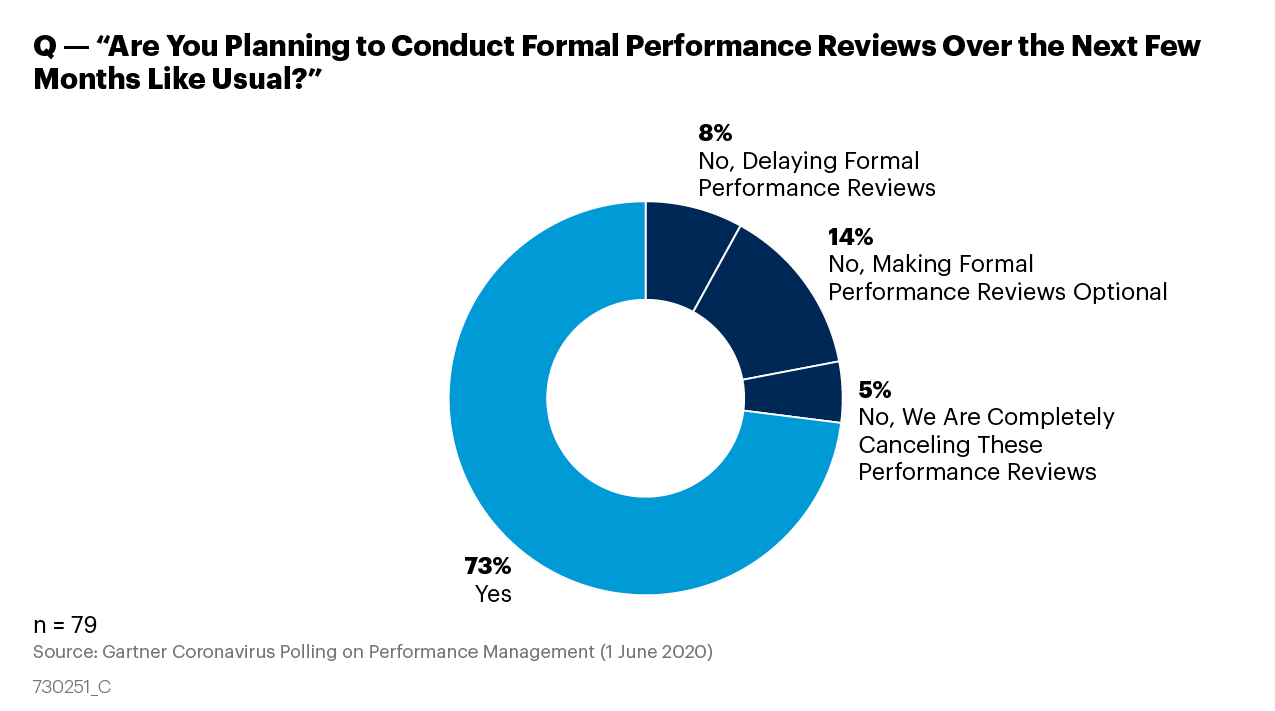
Talent management leaders should encourage managers and employees to adapt check-in conversations in four ways

We’ve reached the time of year when organisations typically conduct mid-year performance reviews, a formal mid-year check-in point in the performance management process. It’s designed to reflect on progress made towards annual objectives or identified goals, and outline performance expectations for the remainder of the year.
But 2020 is far from a typical year, and these traditional check-ins understandably may not be the first thing on managers’ and employees’ minds.
Given the impact the COVID-19 pandemic has had on employees’ work and professional lives, and on business priorities overall, talent management leaders are debating whether to adjust their performance review process this year.
Assessing employees against objectives that don’t consider the impact of COVID-19 on productivity, employee morale and resourcing seems confusing and frankly – unfair. Should they still hold formal reviews? Should they adjust how they assess performance to account for disruption? How will they need to prepare managers differently to deliver performance reviews?
A Gartner survey found that of organisations that normally conduct formal reviews at the mid-year point, 73% are going ahead with them this year. They recognise that performance reviews can be a good way to acknowledge employees’ contributions and provide meaningful feedback.
This presents a tricky obstacle, given many employees realistically won’t be able to deliver their 2020 objectives agreed in January. Hence, many organisations are taking this opportunity to pilot new approaches such as focusing ratings on employee contribution and team performance, as well as scaling performance ratings based on business unit performance.

Of the organisations not conducting formal performance reviews like usual, 14% are making the reviews optional, 8% are delaying reviews and 5% are completely cancelling them. These decisions may be necessary for organisations or specific business units that have experienced significant disruption due to COVID-19. In such cases, organisations may feel that the process will not be useful for employees or the business.
Gartner recommends that talent management leaders encourage managers and employees to adapt check-in conversations in four ways:
Assessing performance will be harder this year, given changes in business priorities and personal circumstances that have likely affected employees’ ability to meet performance expectations. With that in mind, HR leaders are debating how to balance outcomes and behaviours when assessing employee performance.
Twenty-two percent of organisations are asking managers to focus more on behaviours than outcomes when assessing performance this year, and 12% are asking managers to focus more on outcomes than behaviours.
To help managers prepare, most organisations are equipping them for different kinds of conversations, validating the contributions employees have made over whether they are meeting rigid KPIs.
In times of uncertainty, managers must exercise empathy during regular conversations with employees. Conversations during a pandemic should begin with questions about employees’ well-being and safety as a priority – not questions around productivity or even performance.
For example, managers might ask: How are you managing balancing professional and personal demands? How are you adjusting to working remotely? Are you getting the support you need from your peers? Is there anything we can be doing differently as a team? What timelines will we need to adjust?
For most companies, goal setting is still an annual activity. Fifty-two percent of organisations have annual goal setting, and 19% report having no formal policy.
Employees acknowledge that their roles are evolving quickly; they’re learning new skills, performing new activities and collaborating across business lines. Leaders also acknowledge the dynamic nature of corporate strategies. With business plans changing almost daily in response to COVID-19, we need goal-setting processes to keep up.
Organisations must encourage and enable employees to adapt goal setting to keep pace with dynamic business shifts. Focus on shorter term prioritisation of workflow rather than long term goals susceptible to change. Gartner research shows employees with goals that have “high strategic alignment” perform 22% better than those whose goals are no longer relevant.
Only 30% of organisations today require conversations to occur more often than once a quarter. Distractions from the news, responsibilities caring for others at home and adapting to working remotely or newly adjusted hours will likely shift the way employees approach their work and projects. During a pandemic, it is important to help employees focus on short-term priorities to create visibility in the fog.
Instead of asking about past progress or priorities for the next month or quarter, discuss work plans for the next day or the next week to help employees view work in more manageable chunks.
Formal midyear reviews remain a great opportunity for organisations to engage employees, recognise their contributions and identify what high performance looks like during disruption. Gartner research shows that reducing the effort and time spent on reviews doesn’t pay off – it actually has a negative impact on performance and engagement. Rather, organisations are better served ensuring reviews and ongoing conversations create ‘utility’ and serve employee needs, which is shown to increase the workforce’s perception it was worth their time and effort.
Even if organisations decide that too much disruption has occurred to make midyear evaluations useful, they should ensure that employees continue to have informal conversations with their managers. They are important opportunities for employees to adjust their goals and identify ways they can upskill to remain relevant in the new work environment.
Arj Bagga, a director at Gartner, advising HR leaders, COOs and CEOs on people strategy, change management, organisation design and performance management